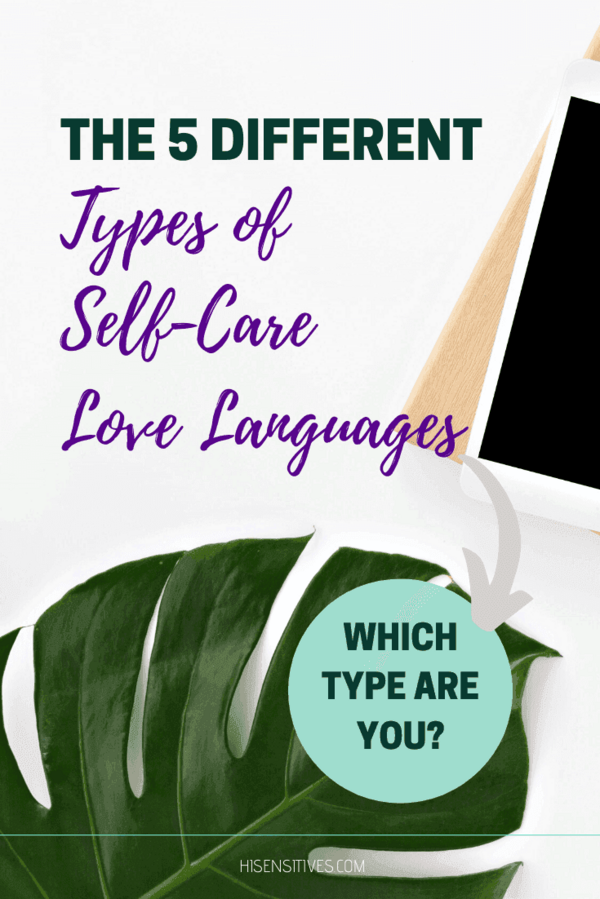Self-care is most effective when you know your self-care love language. In this article, I explain the different types of self-care love languages.
Estimated reading time: 10 minutes
Hey there, lovely readers! We want to be completely transparent with you. Some of the links in this blog are affiliate links, which means if you click on them and make a purchase, we may earn a small commission at no additional cost to you. 😊
We only recommend products and services we genuinely believe in and have personally used or researched. Your support through these links helps us keep bringing you valuable content, so thank you for being amazing!
Self care and self-love are widely used terms when it comes to your mental and physical well-being.
Thousands of resources talk about the importance of taking care of yourself and providing yourself with love. However, I was surprised to see that self care love languages actually are a thing.
I found this knowledge so interesting and eye-opening, that I just had to share it with you in this blog!
In this article, you’ll find out more about self care and learn what love languages are.
Also, you’ll read why it is important to discover your self care love language and how you can discover them.
Ready? Let’s dive straight in!
What Is Self Care?
Self care is an activity that you do for yourself to take care of your mental, physical and emotional well-being.
In fact, self care is super simple; set some time apart to do something that you truly love and that gives your energy. After the self care activity, you should feel recharged and more relaxed.
Sounds easy, right? Yet, so many of us tend to forget to take well care of ourselves through self care and self-love.
I, for example, always seemed to struggle with an unstoppable feeling of guilt whenever I rest or practice self care. Also, I used to feel selfish whenever I spent time on myself.
Society motivates us to be our most productive, most money-making and most hardworking self. Therefore, it isn’t strange that I’ve struggled for so long with this feeling of guilt whenever I took a moment for myself!
The Benefits Of Self Care
In recent years, I’ve learned to see self care as the most productive thing I could do for myself and my life. If you suffer from the same feelings I did, I highly recommend you to shift your perception of self care as well.

Why? Because self care results in these wonderful (health) benefits; your mood increases, your anxiety reduces and it helps you to maintain a good relationship with yourself and others. In addition, self care improves immunity and increases positive thinking.
Once you benefit from these positive side effects of self care, your overall life will improve and you will feel more happy with everything you take on. Therefore, self care is crucial in order to live your happiest, most fulfilled life.
However, self care itself is a rather broad term and I can imagine that you don’t know where to start. That is when the self care love language comes in handy. Before we dive into that topic, let me explain what the love languages are.
What Are Love Languages?
The term love language was first introduced by the famous author Dr. Gary Chapman in his book The 5 Love Languages (affiliate link).
Love languages explain how we feel loved and appreciated by others and Dr. Gary Chapman stated that there are five of them: Words of Affirmations, Acts of Services, Physical Touch, Quality Time and Receiving Gifts.
Oftentimes, many of us can relate to more than one love language, but usually there is one that truly makes us feel loved.
So how do love languages work? Let me give you an example:
Imagine a Russian man and an American woman falling in love with each other. Both don’t speak each other’s languages so communication is quite a challenge.
The Russian tells his American partner that he loves her. However, the American woman does not understand Russian, so she will not acknowledge the fact that he just told her ‘I love you’. The Russian, however, feels like he expressed his love perfectly fine.

Once both start to learn each other’s language, they will be able to express their love for each other in both languages and understand what the other is saying. Only then, both will feel loved and happy with each other.
The same goes for love languages. If your love language is ‘word of affirmations’ and your partner’s language is ‘acts of services’, your partner will only feel truly loved once you start to speak his or her love language by doing acts of services for him or her. ‘Words of affirmations’ won’t do in this case.
In his book, Dr. Gary Chapman dives in detail into the dynamics of the love languages and how they work in a relationship.
Why You Should Discover Your Self Care Love Language
While the theory of the five love languages works perfectly for relationships, it also can be applied when loving and taking care of yourself.
In his book about the five love languages (affiliate link), Dr. Gary Chapman talks about a so-called love tank.
In theory, the love tank needs to be filled up with love from your partner in order to be able to give love. Your love tank is refilled by receiving love from your partner in the way you understand it the most; your love language.
If you don’t refill your partner’s love tank every now and then, the relationship is most likely doomed to fail, as a relationship without love won’t work in the long term.
So if we translate this theory towards self-love and self care, we could call the love tank a ‘self-love tank’.
If you let your self-love tank run empty, you don’t have enough to live your best life and to give love to others.
When I didn’t refill my self-love tank due to my guilt related to self care, I soon experienced symptoms comparable to a burnout. It was terrible and I realized that I did not take well enough care of myself in a way that is good for me.
If you want to avoid this empty feeling, it is important for you to refill your self-love tank regularly. You could perceive it as recharging your battery.
In order to refill your self-love tank, you should practice self care activities that align with your self care love language. For this, it is important to know what your self care love language is.

Self Care Love Languages
While there is no book yet that dives in detail into the theory of self care love languages, the theory from Dr. Gary Chapman’s can easily be translated towards self care.
Most of us naturally give love in a way that we would like to receive it. Therefore, it is logical that your self care love language entails activities that make you feel loved, safe and happy, just like your standard love language does.
Let’s have a look at how the five love languages can be translated into self care love languages:
Words Of Affirmations
This love language is all about receiving affirmation, verbal acknowledgement of affection and encouragement from others.
However, when you translate words of affirmations towards self care love languages, you can think of it as being your biggest cheerleader!
We have incredible power over our minds and by providing ourselves with powerful (words of) affirmations, we can fill up our love tank. If this is your (self care) love language, these activities might fit your self care needs:
- Give yourself a pep talk in front of the mirror
- Write down positive affirmations and repeat them to yourself every day
- Identify your inner critic
- Journaling
- Gratitude
- Make a scrapbook where you add compliments that you are receiving throughout the day
- Take personality tests
- Make a vision board
- Read personal development books
- Write yourself a love letter
- Make a list of all your achievements
- Make a list of your best qualities
Physical Touch
The love language physical touch in relationships involves being touched through hugs, kisses, massages and so on.
If this is your love language, it might seem impossible to do this as a self care activity, but think twice!
Physical touch is all about making your body feel good by focusing on the physical aspect of it. Here are some ideas to try out when your self care love language is physical touch:
- Yoga
- Massages (Either from a professional or with a massage chair)
- Spa days
- Swimming (the water on your skin can be sooo soothing)
- Buy a weighted blanket
- Take a bath
- Spoil your skin and hair with a mask
- Dancing
- Cuddle with your pet (if you have one)
- Walk barefoot on the grass or on a soft carpet
Quality Time
In relationships, the love language quality time is about the time the two of you truly spend together. No cellphones, no tv on in the background, no distractions. Just the two of you and a good conversation or activity that you both enjoy.
When you translate quality time towards self care love languages, you might say that it is about spending time alone with yourself while doing things that you truly love.
Here are some suggestions for those of you, who have quality time as a self care love language:
- Meditation
- Relax in the garden (or on the couch)
- Be creative (f.e. Knit, art, draw)
- Do a moon ritual
- Visit a city you’ve never been to
- Take a walk in nature
- Read a book
- Plan a retreat doing all the things you love
- Listen to music
- Book a weekend getaway for yourself
Acts Of Service
Acts of services involve doing things for others. You feel the most loved when others are doing something for you that you need.
This could be anything from washing your laundry, taking out the trash or walking the dog.
If this is your self care love language, know that there are tons of acts of services that you can do to fill up your self-love tank:
- Organize your home by doing a declutter challenge
- Cook yourself a meal you’ve always wanted to try
- Do some gardening
- Make yourself a nice cup of tea (or coffee, if you can handle the caffeine)
- Bake a cake
- Paint your home in new colours
- Do some meal prepping for the week
- Make a clear planning for the week ahead
- Start your day with a good breakfast

Gifts
The final love language, gifts, is about spoiling your partner with things they have been wanting or that they need.
When it comes to self care, this love language is all about treating yourself by buying things and/or experiences that increase your happiness and well-being.
Here are some ideas for those of you whose primary self care love language is receiving gifts:
- Go on a shopping spree to update your closet
- Treat yourself to go on that vacation you’ve been dreaming about forever
- Buy yourself comfortable clothes to wear at home
- Invest in your personal and professional growth
- Order dinner instead of cooking it yourself
- Treat yourself to meaningful items that have been on your wishlist for years
- Improve your sleep by investing in a good mattress and bedding
How Do I Find Out What My Self Care Love Language Is?
While there is no official test on self care love languages yet, a good alternative might be to take the love languages test on this website.
By understanding what your love language is in a relationship, you will learn how you truly feel loved by someone else.
Once you translate that love language into some of the self care activities mentioned above, you might notice that you feel more energized and happy very soon. Why? Because you fill up your self-love tank!
Now that you have learned more about the self care love languages, I am curious: What is your self care love language? Please share it in the comments!






